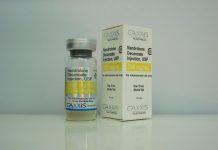Testosterone is an important hormone for maintaining vitality and well-being, with many turning to prescriptions for testosterone to address deficiencies. Testosterone cypionate, a synthetic androgen and anabolic steroid ester of testosterone, is frequently utilized for its efficacy in medical use, given by injection to treat conditions stemming from congenital or acquired deficiencies. While testosterone cypionate may offer a path to restored vigor, it is a controlled substance in the United States due to the risk of side effects and the potential for moderate or low to high physical or psychological dependence.
From Lab to Gym: How MK-677 Could Revolutionize Muscle Wasting Treatment
Emerging from the confluence of medical research and bodybuilding communities, MK-677, also known as Ibutamoren, has shown considerable promise in the fight against muscle wasting conditions. Initially synthesized for the purpose of combating conditions like sarcopenia and cachexia, MK-677 operates by mimicking the action of the hormone ghrelin, which has a natural propensity to stimulate both appetite and the secretion of growth hormone (GH). The mechanism is relatively straightforward yet profound: by promoting increased levels of GH and IGF-1 (Insulin-like Growth Factor 1), it effectively drives anabolism—the body’s muscle-building process—forward.
The implications for patients suffering from muscle wasting diseases are significant. Currently, the standard treatments involve the administration of anabolic steroids or synthetic GH, both fraught with potential side effects and legal constraints. MK-677, on the other hand, offers a non-peptidic and orally active alternative that has demonstrated an impressive safety profile in early clinical trials. Notably, in contrast to exogenous testosterone or GH treatments, MK-677 does not suppress the body’s natural hormone production, which represents a considerable advantage in terms of long-term health outcomes. As research steadily progresses from laboratory settings into controlled human trials, the potential for MK-677 to shift the paradigm of muscle wasting treatment from invasive injections to simple oral administration is becoming an increasingly tangible reality, poised to make the leap from the lab bench to a gym near you.
The MK-677 Phenomenon: A Closer Look at Human Growth Hormone Enhancement Benefits
The allure of MK-677 extends beyond its therapeutic potential; it has sparked a phenomenon among those seeking to leverage its human growth hormone enhancement benefits for athletic performance and anti-aging purposes. Delving deeper into the science reveals just how MK-677 exerts its effects by modulating the GH/IGF-1 axis. This regulation results in a host of physiological improvements that include increased lean muscle mass, enhanced sleep quality, a boon for recovery processes, and even potential improvements in skin and hair quality—benefits classically attributed to high levels of GH.
Furthermore, the compound has been observed to promote nitrogen retention—a critical factor in muscle growth and repair—and to increase bone mineral density, which could have significant implications for both the young individuals facing growth challenges and the elderly combatting osteoporosis. The long-lasting half-life of MK-677 means that a single daily dose can maintain stable blood levels, providing a consistent stimulus for GH release and thus amplifying these benefits over time.
Athletes and bodybuilders are drawn to MK-677 for its capacity to enhance physical performance without many of the side effects associated with traditional anabolic steroids, such as liver toxicity or alterations in cholesterol levels. Meanwhile, individuals interested in anti-aging strategies find its potential to decelerate some elements of the aging process particularly appealing. It’s important to note that while the initial data on MK-677 is promising, more comprehensive studies are needed to fully understand its long-term implications. Nonetheless, as it garners more attention from both the scientific community and public alike, MK-677 stands at the forefront of a new wave of GH enhancement strategies that could redefine how we approach physical optimization.
Growth Hormone Reimagined: The Promising Role of MK-677 in Boosting Testosterone
MK-677, a non-peptide spiropiperidine, is making waves as an agonist of the ghrelin receptor and growth hormone secretagogue, heralding a new chapter in androgen replacement therapy. In contrast to traditional testosterone boosters such as testosterone cypionate and testosterone enanthate, MK-677 operates by mimicking the action of the hormone ghrelin. This can indirectly enhance the levels of the hormone testosterone, thus offering a cutting-edge approach to testosterone therapy for transgender men and those with congenital or acquired deficiencies. While MK-677 is not an ester of testosterone or an anabolic androgenic steroid like testosterone cypionate or testosterone undecanoate, its efficacy in elevating natural testosterone levels poses a groundbreaking alternative, potentially circumventing the risk of side effects associated with direct testosterone replacement therapy in men.
As research unfolds, medical use of MK-677 continues to be explored, with some studies suggesting its capacity to support muscle growth, which is a common goal in health and wellness programs that utilize bioidentical hormones in endocrinology practice. The potential for abuse, however, categorizes it alongside controlled substances in the United States, similar to schedule III drugs such as synthetic androgen and anabolic steroid preparations, which can lead to moderate or low physical dependence or high psychological dependence. Prescriptions for testosterone therapies and their alternatives are strictly regulated due to the risk of side effects; therefore, MK-677’s prescriptions must be approached with care, demanding vigilant prescription drug monitoring.

Shaping the Future: How MK-677 Increase is Beneficial in Treating Growth Hormone Deficiencies
Emerging as a promising agent in the field of endocrinology, MK-677 has captured the attention of health professionals for its role in treating growth hormone deficiencies. Unlike direct testosterone therapy using compounds such as testosterone cypionate or testosterone enanthate—which can lead to serious complications such as altered hemoglobin and hematocrit levels—MK-677 offers a safer and effective alternative by stimulating endogenous growth hormone release. Senator Markey and other policymakers closely observe the prescribing of controlled substances such as these, ensuring medical practices align with patient safety protocols.
Unlike anabolic steroids that are given by injection and can increase the risk of developing conditions such as polycythemia, MK-677 is administered orally, which may reduce the potential for abuse and side effects. The synthetic agent has been spotlighted in the Journal of Clinical Endocrinology for its potential to sustainably raise growth hormone levels without significantly impacting cortisol, insulin, prolactin, or thyrotropin levels. For transgender people undergoing testosterone therapy for gender affirmation processes, treatment regimens may need to be adjusted based on individual responses and potential drug interactions.
Importantly, MK-677 does not fall under typical anabolic androgenic steroid classifications; yet, its ability to enhance growth hormone profiles seamlessly fits into the paradigm of controlled substance management. With careful monitoring of wrist and hand every 6 months—as well as regular evaluation of natural testosterone production—MK-677 could potentially reforge the landscape of hormone replacement therapy, delivering tailored solutions for individuals with both hormone deficiencies and those seeking alternative avenues for testosterone enhancement.
Testosterone Cypionate: Harnessing Hormones for Health or Hazard?
Taking testosterone, particularly in the form of testosterone cypionate, has been a subject of medical use for various conditions, including hypogonadism in cisgender men—where the body’s natural testosterone production is deemed insufficient due to congenital or acquired reasons. Testosterone cypionate is an ester of testosterone and a controlled substance in the United States, classified as a Schedule III drug due to its potential for abuse, which may lead to moderate or low physical dependence and high psychological dependence. This means prescriptions for testosterone are carefully regulated, and healthcare providers must be diligent in their prescription drug monitoring to mitigate the risk of side effects and misuse.
While testosterone therapy can offer health and wellness benefits by restoring vigor and correcting hormonal imbalances, it’s also accompanied by possible side effects that may introduce new hazards to your health. For instance, testosterone cypionate may increase hemoglobin and hematocrit levels, leading to serious conditions like polycythemia. Furthermore, individuals on testosterone cypionate may need to have their dosage adjusted to avoid an increased risk of developing adverse reactions. Understanding the efficacy of testosterone cypionate, while acknowledging its designation as a Schedule III controlled substance, is crucial for both patients and practitioners to ensure safe and effective treatment.
Injecting Change: How Testosterone Cypionate Shapes Gender-Affirming Therapy
The use of testosterone therapy for transgender men is a cornerstone in gender-affirming treatment, wherein testosterone is an important synthetic androgen and anabolic steroid that can lead to profound physical changes aligning their appearance with their gender identity. Testosterone cypionate, given by injection, is one such form that has been shown to significantly aid in this transition. It’s a bioidentical hormone that closely mimics natural testosterone, helping transgender people affirm their gender through physiological alteration.
The efficacy of testosterone cypionate in gender-affirming therapy is reported widely in the literature, including journals like the “Journal of Clinical Endocrinology” and publications discussing “Bioidentical Hormones in Endocrinology Practice.” When prescribed for transgender men, the medication can induce masculinizing effects such as deepening of the voice, increased body hair, and redistributive body fat. As with all prescriptions for testosterone, the prescribing of controlled substances like testosterone must be approached with care to minimize the risk of side effects. Regular monitoring of the patient’s response to treatment, including checking for drug interactions and adjusting dosages as necessary, ensures that patients remain within a safe threshold while reaping the intended benefits of therapy. Despite this careful management, there remains a risk of side effects; for instance, some individuals may experience elevated blood pressure or mood swings. Adhering to guidelines for safe administration can make testosterone cypionate a powerful tool in the journey towards congruence between one’s gender identity and physical self.













